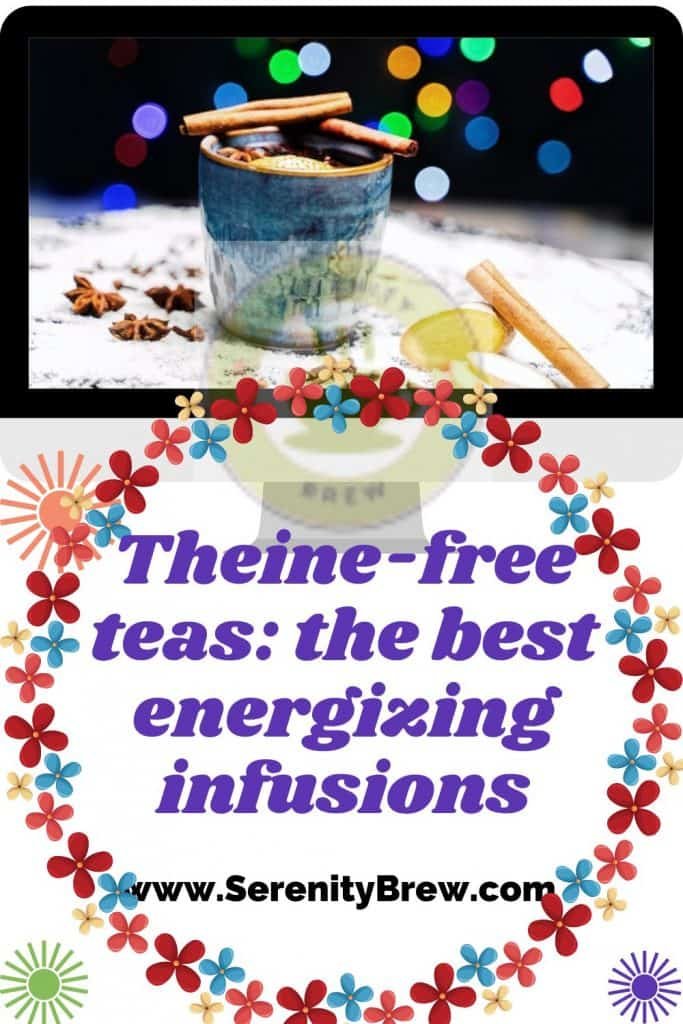
Are you one of those people who are sensitive to caffeine but need a hot drink to start the day and clear their heads? Today we will talk about “teas without theine” or how to try to eliminate caffeine from your breakfasts without falling asleep before you get to work.
Tea classes
If you are a regular reader of Infusionismo, you will know that there are teas on the one hand (in fact there are many different ones) and infusions on the other. Tea, proper, comes from the Camellia sinensis plant; in fact, any infusion made with leaves, fruits or roots of another variety of plant cannot be considered tea, but rather, being exact, it would be a tisane or infusion.
Teas and theine
Green, black, white and red teas, in all their varieties, come from Camellia sinensis and, therefore, receive the correct name of tea. Being “teas” they contain theine, although in different proportions. These vary depending on the crop, sun exposure, harvesting stage, the leaves used to make the tea, and the oxidation process the leaves underwent. What’s more, even the temperature of the water and the time of infusion have an influence on the theine that your cup of tea ends up having.
In conclusion, all these factors affect the final theine content; Thus, black tea, being the most oxidized, would in principle be the richest in caffeine (or theine), while less oxidized types, such as white tea, would have less.
In general, we can point out that the theine levels of each tea are around the following values per cup:
- Assam or Darjeeling black tea: between 50 and 100 mg of theine.
- Matcha tea: 68 mg of theine.
- Oolong tea: between 10 and 60 mg of theine.
- Green tea: less than 1 mg of theine.
- Pu-erh: less than 1 mg of theine.
Do the infusions have theine?
As we have already mentioned, teas come from Camellia sinensis while infusions come from other plants. In other words, although tea is always an infusion, not every infusion is a tea.
Now, in this case what interests us most is the theine content of the infusions and here it is important to point out that the infusions do not contain theine, precisely because they are made with leaves, roots or fruits of plants other than tea.
For this reason, infusions of herbs, fruits, roots or rooibos can be a good option to drink at night, without the risk of staying awake and spending hours wondering why you gave in to the whim of having one last tea.
Teas without theine
It sounds crazy but it’s not. Just as we can drink decaffeinated coffee, it is also possible to buy tea without theine. As in the case of coffee, it is not really a theine-free variety, but rather the tea has undergone a process to eliminate its content of said substance. Keep in mind that this treatment can also influence the final flavor and aroma of your cup of tea, since other components such as flavonoids, the antioxidant substances in tea, can be eliminated.
Nowadays, you can get different varieties of tea without theine in the market. If you don’t get it easily, a simple trick to remove some of the theine is to brew the tea as usual and discard that first cup, then re-brew the same tea leaves. Since theine is a water-soluble substance, it quickly passes into water, therefore the second cup would have less of it than the first.
Choose your tea free of theine based on your tastes and preferences. If you have always liked sweet flavors, try fruit infusions. Instead, for more refreshing flavors, you can try infusing different herbs. Do you want a drink that tastes like tea but without theine? Rooibos is the answer.
Theine-free energizing teas

If you are looking for a substitute for coffee to help you start the day in a good mood, you can find several solutions in the world of infusions. Below, we recommend several.
Rooibos
Commonly misnamed tea, rooibos is made from the leaves of the South African plant Aspalathus linearis and therefore it is a tisane. Its slightly bitter taste is reminiscent of black tea, although with fruity and woody nuances, so we can easily use it to replace it and enjoy a caffeine-free hot drink.
Chai latte
The Chai Latte is very fashionable and you can prepare it free of caffeine at home. For that, instead of infusing black tea together with traditional spices (ginger, cardamom, black pepper, cloves, nutmeg, anise and cinnamon), choose rooibos. If you wish, you can even prepare an infusion only of spices, you will see how delicious it is!
Mint infusion
Perhaps one of the best known and most common infusions in homes is mint. Its refreshing and intense flavor is a good wake-up aid for those who want a teine-free hot drink. In addition, it can also be drunk cold during the summer.
Ginger infusion
Alternative medicine recommends this infusion to treat all kinds of discomfort, from respiratory to inflammatory. The best? Its spicy flavor may be what you need to clear your head and warm up during the cold days of winter, and without providing theine!
If the flavor is too overwhelming for you, try reducing the amount of ginger and combining it with a few lemon wedges and honey to soften it.
Rosemary infusion
Some call it Mediterranean ginseng. A good warm infusion of rosemary is a great energizer to start the morning in good spirits. In addition, rosemary is a great antibacterial and has many other health properties.
These are just some of the many non-theine tea options that you can taste. Cheer up to try new flavors!
